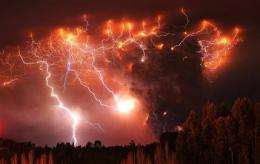Lightning strikes over the Puyehue volcano, over 500 miles south of Santiago, Chile, Monday June 6, 2011. Authorities have evacuated about 3,500 people in the nearby area. The volcano was calm on Monday, two days after raining down ash and forcing thousands to flee, although the cloud of soot it had belched out still darkened skies as far away as Argentina. (AP Photo/Francisco Negroni, AgenciaUno) CHILE OUT, NO PUBLICAR EN CHILE, NO SALES
(AP) -- An erupting Chilean volcano sent a towering plume of ash across South America on Monday, forcing thousands from their homes, grounding airline flights in southern Argentina and coating ski resorts with a gritty layer of dust instead of snow.
Booming explosions echoed across the Andes as toxic gases belched up from a three-mile-long (five-kilometer long) fissure in the Puyehue-Cordon Caulle volcanic complex - a ridge between two craters just west of the Chilean-Argentine border that began erupting Saturday.
Winds blew a six-mile-high (10-kilometer-high) cloud of ash all the way to the Atlantic Ocean and even into southern Buenos Aires province, hundreds of miles to the northeast.
Authorities in Chile went house to house, trying to persuade stragglers near the volcano to leave because of an increasing danger of toxic gas and flash floods. More 3,500 people were evacuated from 22 communities as swarms of earthquakes Saturday heralded the eruption and hundreds more fled Monday to shelters farther away.
Some refused to leave, wanting to protect their homes and livestock. Chile's verdant lakes region is a center for dairy farming, with more than 9,000 cows and sheep.
Deputy Interior Minister Rodrigo Ubilla said about 50 families in the Rininahue area refused to abandon their homes.
"Everything is prepared with shelter and transportation for them to immediately leave the danger zone," added Vicente Nunez, director of Chile's emergency preparedness office, urging them to leave.
The biggest danger was to the Rininahue area Just north of the complex of volcanoes, where the communities of Lago Ranco and Futrono were particularly vulnerable to flash floods, authorities said.
Enrique Valdivieso, the director of Chile's National Geology and Mines Service, said the fissure was belching toxic gases and material that could clog rivers and force them to overflow.
Spectacular displays of lightning flashed in the volcanic clouds during the weekend, and while the amount of ash falling east of the volcano subsided significantly by Monday, experts said it was too early to predict how long it will take before the volcano falls silent.
Volcanic dust coated ski slopes above San Carlos de Bariloche and Villa la Angostura two weeks before the official start of the winter skiing season. The resorts' trade group said it was too early to say how it would affect the local economy, but for now, residents were told to stay indoors and tourists were asked not to come.
The Cordon Caulle is nearly 620 miles (1,000 kilometers) south of Santiago, in Chile's lakes region, just west of Bariloche. Authorities went on alert before the eruption Saturday when as many as 240 tremors an hour struck the region.
The volcano's last major eruption was in 1960, shortly after a 9.5 magnitude earthquake, the most powerful in recorded history, struck Chile.
Some scientists have said that last year's 8.8 quake in Chile increased the likelihood of volcanic activity due to shifts in pressure along the Earth's tectonic plates.
The ash cloud first blew over Argentina and then circled back over Chile on Sunday. By Monday, however, prevailing winds had spread the ash eastward as far as Bahia Blanca, in southern Buenos Aires province on the Argentine coast.
During the weekend, the volcano spat out pumice rocks nearly eight inches (20 centimeters) in diameter.
All flights between Buenos Aires and the Andean resorts of Bariloche, Esquel and Chapelco were canceled until June 12. Seven other airports in Argentina were closed through Tuesday, effectively isolating the southern Patagonia region from the rest of the country.
LAN airlines suspended more than 35 flights from Chile to southern Argentina, and some highways in Argentina also were closed.
Across Argentina's southern midsection, schools were closed, routine government work was suspended and elective surgery were canceled as well.
Also closed was the nearby border crossing of Cardenal Samore, where a twisting mountain road climbs through stunning arid valleys on the Argentina side before dropping through lush green forests and fields in Chile. Even when skies cleared in places Monday, the area was draped in an abrasive gray blanket.
The 11-mile-long (17-kilometer-long) Cordon Caulle rises 5,900-feet (1,800 meters) above sea level between the Pueyehue and Nevada volcanoes, above a connected complex of molten rock. Chile has more than 3,000 volcanoes along its Andean spine, and 500 of these are considered geologically active. About 60 Of these have erupted in the last 450 years.
©2011 The Associated Press. All rights reserved. This material may not be published, broadcast, rewritten or redistributed.
























